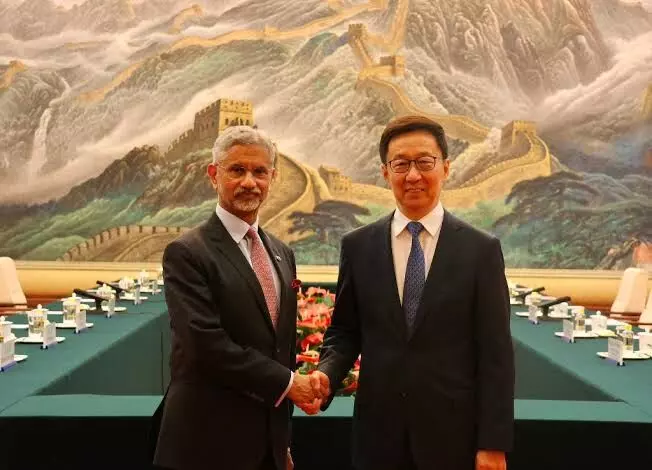A Delicate Dance: Decoding Jaishankar's Beijing Sojourn

The recent visit of India's External Affairs Minister, Dr. S. Jaishankar, to Beijing, commemorating the 75th anniversary of India-China diplomatic relations, was more than just a diplomatic courtesy. It was a carefully calibrated maneuver in the intricate ballet of one of the 21st century's most defining geopolitical relationships. Far from the grand pronouncements of an era of unfettered cooperation, this engagement underscored a pragmatic, almost cautious, optimism for a future where competition and cooperation must somehow coexist.
For too long, the narrative surrounding India and China has been caught in a simplistic binary of friendship or rivalry. The reality, as Jaishankar’s trip subtly reinforced, is a far more complex tapestry woven with threads of shared history, burgeoning economic ties, and deeply entrenched strategic divergences. The painful lessons of the Eastern Ladakh standoff still resonate, a stark reminder of the inherent fragility of the border and the critical need for constant, candid dialogue.
The Minister's emphasis that "differences should not become disputes, nor should competition ever become conflict" serves as the foundational principle for this new phase of engagement. This isn't a new mantra, but its reiteration in the hallowed halls of Beijing suggests a renewed commitment to its spirit. The "good progress in the past nine months for the normalization of our bilateral relations," primarily driven by de-escalation along the border, is a testament to the persistent efforts on both sides. Yet, true normalization remains elusive. The continued presence of significant troop deployments on either side underscores that while friction points may have been managed, the underlying issues demanding full de-escalation are far from resolved. Peace and tranquility on the border are not just a desirable outcome; they are the absolute prerequisite for any meaningful progress elsewhere.
*Beyond the Border: Economic Realities and Human Connections*
Beyond the immediate imperative of border stability, Jaishankar’s discussions delved into the complex economic realities that bind and sometimes strain the two nations. China's enduring status as India's largest trading partner is a double-edged sword. While it signifies robust commercial ties, the ever-widening trade deficit in Beijing's favor remains a persistent thorn in India's side. The Minister's veiled reference to "restrictive trade measures and roadblocks" likely alludes to China's curbs on critical mineral exports, a move that directly impacts India's manufacturing ambitions. For the economic relationship to truly flourish, it must evolve beyond mere volume to embrace equity and sustainability. Indian businesses need a level playing field, not just access to a vast market.
Equally vital, and perhaps more indicative of the long-term health of the relationship, are the people-to-people connections. The five-year hiatus in the Kailash Manasarovar Yatra, now thankfully resumed, highlights the detrimental impact of strained relations on cultural and spiritual ties. Agreed steps to facilitate travel and restore direct flight connectivity are crucial. These exchanges aren't just about tourism; they are about fostering mutual understanding, breaking down stereotypes, and injecting a much-needed dose of human warmth into a relationship often dominated by geopolitical calculations.
The discussion on trans-border rivers is another pragmatic example of areas where cooperation is not just beneficial, but essential. The timely sharing of hydrological data by China is vital for India’s flood management and water resource planning. Such collaboration on shared environmental concerns underscores a shared responsibility that transcends political differences.
*Navigating the Future: A Pragmatic Partnership*
Looking ahead, the India-China relationship is a defining global dynamic. As two economic behemoths and rising powers, their interactions will inevitably shape the future of Asia and beyond. A stable, constructive relationship is not merely a bilateral aspiration; it is a global imperative. This necessitates handling relations with mutual respect, mutual interest, and mutual sensitivity – principles that, while frequently articulated, are constantly tested in practice.
The inherent complexities are undeniable. Differing security perceptions, divergent alliances, and competing aspirations for regional leadership will continue to shape their interactions. However, the alternative – unmanaged rivalry or, worse, open conflict – is a scenario too dire to contemplate.
Therefore, India's strategy, as exemplified by Jaishankar's visit, appears to be one of persistent, pragmatic engagement. It seeks to identify areas of common ground, firmly assert national interests when necessary, and always advocate for adherence to international law. This isn't about ignoring differences, but about managing them maturely, preventing them from escalating into disputes, and ultimately harnessing areas where mutual benefit can be achieved.
The 75th anniversary of diplomatic relations offers a moment for both reflection and renewed commitment. It serves as a powerful reminder that despite periods of tension, these two ancient civilizations share a profound stake in each other's future. The recent engagement, while not a miraculous cure for all ailments, represents a vital, if challenging, step towards charting a realistic and responsible path forward. The task is indeed formidable, but the imperative for a stable and constructive India-China relationship remains undiminished.
